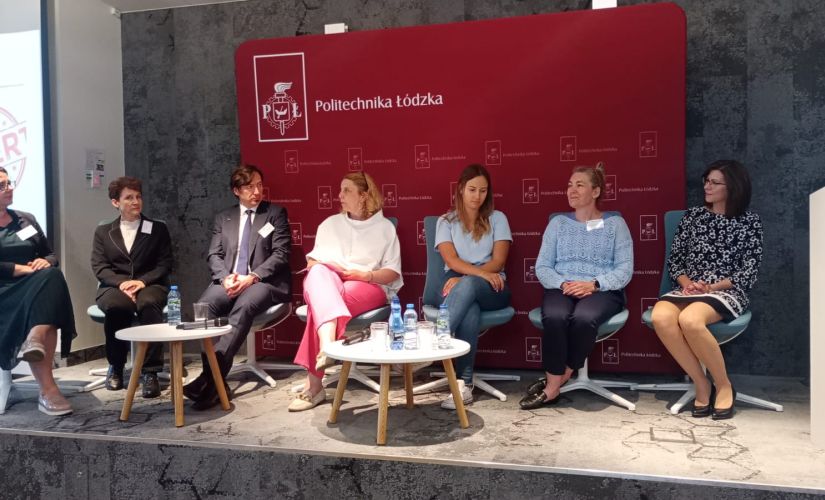The meeting was officially opened by Rector prof. Krzysztof Jóźwik. Next, the attendees of the event were greeted by the ICC director dr inż. Dorota Piotrowska. They included Magdalena Jarzyńska, coordinator of EU-funded projects (NAWA), Katarzyna Żochowska-Ziernik, chief specialist of the Foundation for the Development of the Education System, dr Krzysztof Chmielewski, deputy dean of the College of Management at the Leon Koźmiński Academy, and representatives of the universities of technology in Kraków, Wrocław, Gdańsk, Śląsk, Poznań, the Nicolaus Copernicus University in Toruń, the University of Łódź, and the University of Wrocław.
As a result of the project, Lodz University of Technology, in collaboration with three international universities, has worked out double diploma models built on the basis of the already established second-degree programs. Also, a double diploma agreement was concluded with Universidade de Vigo in Spain for Electronics and Telecommunication, as well as letters of intent for a double diploma in Smart Manufacturing with two French universities - ENSAM - École Nationale Supérieure d'Arts et Métiers in Paris and ECAM - École Catholique d'Arts et Métiers in Lyon.
The first part of the conference saw the presentation of the outcomes of the project. Project team members introduced the main objective of the project, which was to advance internationalization in its broadest sense, and which was prompted by the need to foster development and cooperation with other universities in the field of double degrees. Also discussed were issues related to quality assurance in double diploma education, which entails a very careful study of other higher education systems in Europe. Active teaching and learning approaches applied in the classroom and ideas for the future regarding the implementation of such methods were exchanged.
The presentations were punctuated by footage of the participating partners speaking about the challenges to double diplomas and the administrative processes involved. The partners also talked about the efficacy of innovative teaching methods deployed by their universities in their respective teaching.
The last presentation of the session dealt with medium- and short-term mobility and the system of the award of partial qualifications. In view of the changing socio-economic environment leading to a decline in the popularity of term and year-long trips, the new perspective of the Erasmus+ program was presented that offers a number of short mobility opportunities. Last but not least, principles for the recognition of learning outcomes and qualifications acquired in the course of completing these forms were addressed that accommodate the needs of the students today.
ICC director dr inż. Dorota Piotrowska delivered a talk on Double degrees/Joint degrees/European Degree - past/present and future - briefly about opportunities and challenges faced by the Polish higher education system. She addressed the problem of formal education, non-formal education, and informal learning, as well as the award of full qualifications in cooperation with partner universities. She also discussed the implications and concerns related to the legal regulations pursuant to which qualifications are awarded.
Magdalena Jarzyńska outlined NAWA's offer to bolster the development of joint degrees. She referred to international trends in higher education including short international education programs, micro-credentials, dual and multiple degree programs, international university partnerships.
As the conference was drawing to a close, the time came for a panel discussion on good practice in the drafting, conclusion, and qualitative performance of double diploma agreements, moderated by ICC director dr inż. Dorota Piotrowska. Among the panelists were representatives of the academic staff: dr Krzysztof J. Chmielewski, deputy dean of the College of Management, dr hab. inż. Ewa Raj, deputy dean for education EEIA Faculty, and of the administrative staff: Agata Antonik, Student Mobility Section of ICC TUL, and Adriana Naciążek, head of the International Cooperation Department, Wrocław University of Technology. The Erasmus+ National Agency was represented by Katarzyna Żochowska-Ziernik, Office of Higher Education Programs. Additionally, a student engaged in a double diploma program shared her observations and experiences.
The panel provided an excellent opportunity to discuss the design of double diploma curriculum, exchange information on academic issues and administrative steps involved in the drafting and execution of agreements. A variety of challenges and obstacles associated with the double diploma were discussed, as well as funding opportunities from Erasmus+ programs. The atmosphere conducive, conference attendees were also invited to join in the discussion.
The results achieved through the activities completed in the course of the Active Double Degree project will certainly serve as a stimulus for Lodz University of Technology to expand and strengthen international cooperation whereas the discussions that took place during the conference provided valuable tips and advice for future application.

